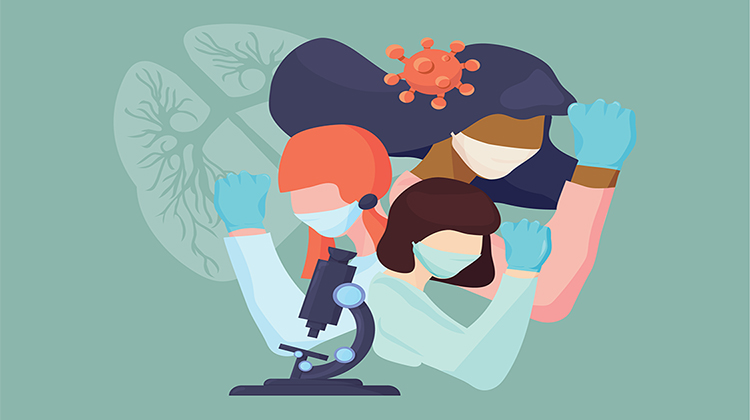Women in Stem with María Perelló
Posted: 16 September 2024 | Dr María Perelló (Daiichi Sankyo Spain) | No comments yet
We had the privilege of talking to María Perelló, Medical Director at the Oncology Business Unit at Daiichi Sankyo Spain. As a gynaecologist, with a PhD in Endometriosis and an Executive MBA, she has many years of experience in the pharma industry as Medical Advisor, Medical Manager and Therapeutical Area Manager. She is a key player to help Daiichi Sankyo improve standards in cancer patient care.


Can you tell us about your journey in the field of STEM and the challenges you encountered along the way?
First of all, thank you so much for having me. Drug Target Review’s commitment to highlighting diverse experiences resonates deeply with me, and I’m honoured to be a part of this conversation.
My love for science truly began at home. My father, a passionate chemistry teacher, ignited a spark of curiosity in both me and my sister that led me towards a career in medicine. However, my path wasn’t without its hurdles. As a woman in STEM, I’ve encountered challenges like the lack of female role models and navigating work-life balance. But with unwavering ambition, the support of incredible mentors, and a dedication to setting high goals, I’ve found myself in a position where I can truly contribute to improving the lives of millions battling cancer.
What inspired you to pursue a career in STEM, and how did you overcome any obstacles or biases you may have faced?
My father’s infectious enthusiasm for science is definitely what sparked my initial curiosity about the world around me. Once you experience the thrill of a scientific discovery, there’s no turning back! It’s an exhilarating feeling to solve complex problems and make ground-breaking discoveries. But curiosity alone isn’t enough; you need perseverance to overcome challenges. My journey in STEM has been demanding, but incredibly rewarding. I’m grateful for the opportunities that have allowed me to learn and grow, and I’m passionate about continuing to make a positive impact through science.
Could you share an example of a specific project or research that you have worked on and how it has contributed to advancements or improvements in your field?
I did my PhD on endometriosis. This is a benign chronic disease that affects around 10 percent of women in fertile age, so very prevalent, but still quite unknown and with a low amount of treatment alternatives. Moreover, it can have very important complications as infertility or chronic pelvic pain with a high detriment in quality of live for patients. My contribution was through a predictive model to detect patients that has a more severe type of endometriosis to better plan a directed surgery for them and avoid complications. In addition, I did some preclinical research in mice to try to find new ways of treatments and all the research ended up with three publications in high impact journals. Of course this is a seed in the field, but there are many things to be done in this disease.
As a woman in STEM, what unique perspectives or strengths do you believe you bring to your work?
Women in STEM often excel at collaboration and communication, fostering a team-oriented environment that breeds innovation. Additionally, our inherent empathy allows us to develop more inclusive and impactful solutions. These qualities, coupled with resilience and tenacity, empower us to approach problems from diverse angles and contribute significantly to our work in STEM fields.
What advice would you give to young women who are considering a career in STEM but may be hesitant due to societal stereotypes or perceived challenges?
In my opinion, there are three key pieces of advice for young women considering STEM careers: embracing curiosity, surrounding with mentors and peers who encourage you and celebrate your achievements and self-confidence. And as I mentioned perseverance needs to be your travel partner.
How do you see the representation of women in STEM changing over the years, and what further progress do you believe is needed?
I see a positive shift in the representation of women in STEM. More women are holding leadership roles, achieving recognition in their fields, and inspiring future generations. There are also more initiatives focused on mentorship and promoting female role models, like Mujeres en Farma in Spain, which is commendable. However, there’s still room for progress. We need to address unconscious bias in hiring and promotion practices and develop policies that support balancing career aspirations with personal life choices. The pharmaceutical industry, for example, is a leader in creating a more inclusive environment.
In your opinion, what can organisations and institutions do to create a more inclusive and supportive environment for women pursuing STEM careers?
Lots of things, such promoting diversity & inclusion initiatives, showcasing the achievements of women in leadership positions to inspire future generations as we have been doing in the last couple of years at Daiichi Sankyo Spain, providing a flexible work environment. I think that organisations and leaders can send a powerful message of inclusivity.
Looking ahead, what exciting developments or advancements do you foresee in your field of STEM, and how do you envision your own research contributing to those future innovations?
As the Medical Director at a leading oncology pharmaceutical company, I see exciting advancement, such more precise therapies that target a patient’s cancer cells specifically, exploring innovative treatment combinations, and advancing the use of biomarkers for better patient selection. These are just a few examples, but I’m confident that through the combined efforts of thousands of dedicated scientists worldwide, we can create a more hopeful future for cancer patients. Additionally, AI and machine learning have the potential to revolutionise the way we diagnose and treat cancer. I’m incredibly excited to witness the advancements that lie ahead in the coming years.
About the author
María Perelló, Medical Director Oncology at Daiichi Sankyo Spain


DAIICHI-SANKYO
María Perelló is Medical Director at the Oncology Business Unit at Daiichi Sankyo Spain. Gynecologist, summa cum laude PhD in Endometriosis and Executive MBA, she has many years of experience in Pharma Industry as Medical Advisor, Medical Manager and Therapeutical Area Manager besides participating in many lines of research at Hospital Clinic of Barcelona and several publications in high Impact Factor Journals. As Medical Director, Maria is a key player to help Daiichi Sankyo to improve standards in cancer patient care.
Related organisations
Daiichi Sankyo Spain
Related people
Dr María Perelló (Daiichi Sankyo Spain)



